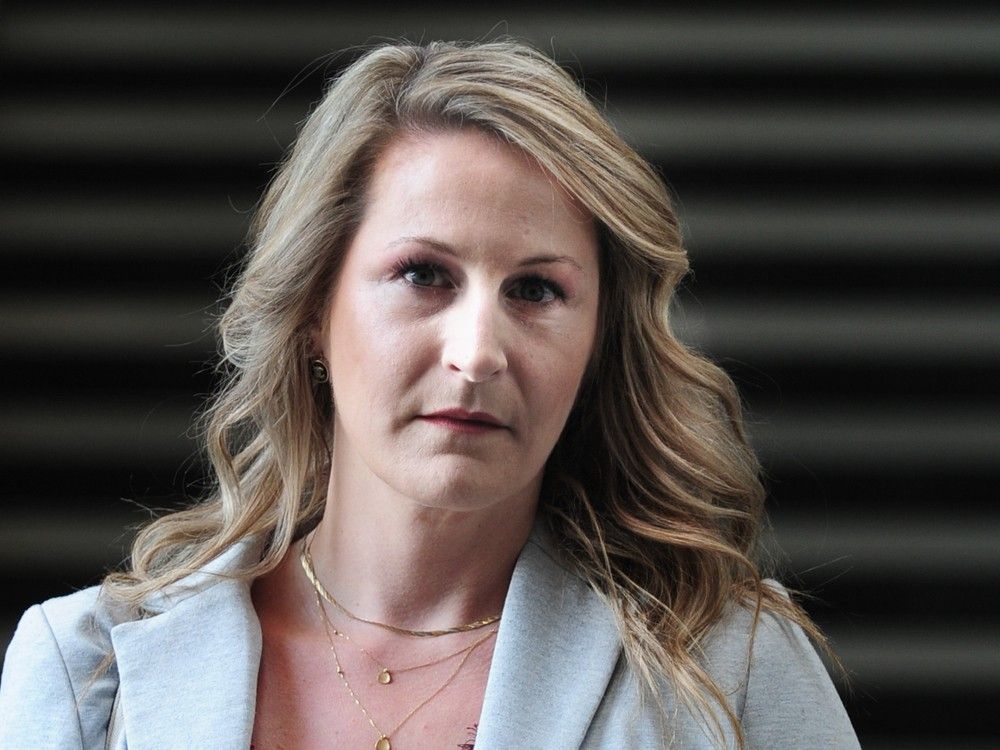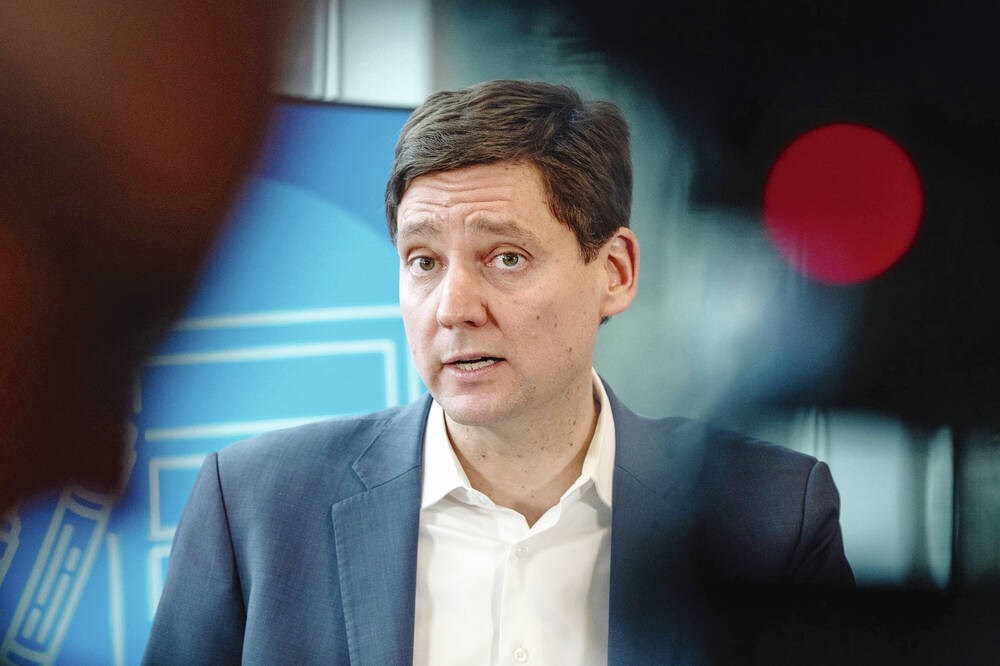About effing time.Looks like they're officially walking back the drug policy.

B.C. seeks ban on public drug use, dialing back decriminalization
The B.C. NDP has asked the federal government to recriminalize public drug use, marking a major shift in the province's approach to addressing the deadly overdose crisis.bc.ctvnews.ca
You are using an out of date browser. It may not display this or other websites correctly.
You should upgrade or use an alternative browser.
You should upgrade or use an alternative browser.
2024 BC Election
- Thread starter RangerRay
- Start date
daftandbarmy
Army.ca Dinosaur
- Reaction score
- 31,757
- Points
- 1,160
Looks like they're officially walking back the drug policy.

B.C. seeks ban on public drug use, dialing back decriminalization
The B.C. NDP has asked the federal government to recriminalize public drug use, marking a major shift in the province's approach to addressing the deadly overdose crisis.bc.ctvnews.ca
Only after multiple complaints like this from their Union base ...
Illicit drug use in Island Health hospitals sparks WorkSafeBC investigation
"I've been nursing for 14 years and ... the illicit drug use is just so much more prevalent," says one nurse at Royal Inland HospitalIllicit drug use in Island Health hospitals sparks WorkSafeBC investigation
WorkSafeBC has inspected several Island Health hospitals following complaints of nurses and health-care staff being exposed to illicit drug smoke, Postmedia has learned.
The inspections at Campbell River General Hospital, Victoria General Hospital, Royal Jubilee in Victoria, and at several community health sites were in response to “several symptomatic worker exposures to illicit substances in Island Health work sites,” according to a WorkSafeBC report dated June 15, 2023.

Illicit drug use in Island Health hospitals sparks WorkSafeBC investigation
"I've been nursing for 14 years and ... the illicit drug use is just so much more prevalent," says one nurse at Royal Inland Hospital.
Brad Sallows
Army.ca Legend
- Reaction score
- 8,634
- Points
- 1,040
Be cheerful. Governments don't always undo something just because the empirical evidence shows more harm than good.
daftandbarmy
Army.ca Dinosaur
- Reaction score
- 31,757
- Points
- 1,160
Be cheerful. Governments don't always undo something just because the empirical evidence shows more harm than good.
Good point!
Les Leyne: Public safety forces retreat on decriminalization
B.C.’s historic drug decriminalization experiment is being dramatically scaled back as the NDP government retreats in the face of sustained public anxiety about what it is doing to perceptions of public safety.
Just So You Know: The enormous amount of faith that was placed in decriminalization stemmed from how unanimous all the experts were.
That started breaking down with senior police leaders’ testimony at federal hearings last week that there was no sign it was working.
They also confirmed widespread diversion of safe-supply drugs, where people with dependencies sell the allotment provided by clinics, or trade up. Eby’s government has denied that for months now. But you have to wonder if safe supply will follow the decriminalization route — a major new, widely endorsed policy that created disastrous unintended consequences and went sideways.

Les Leyne: Public safety forces retreat on decriminalization
B.C.’s historic drug decriminalization experiment is being dramatically scaled back as the NDP government retreats in the face of sustained public anxiety about what it is doing to perceptions of public safety.
 www.timescolonist.com
www.timescolonist.com
RangerRay
Army.ca Veteran
- Reaction score
- 3,777
- Points
- 1,260
In this nuanced article by Andre Picard in the Globe and Mail, it sounds as though this project was doomed from the start. In typical Canadian fashion, only one part of a comprehensive drug strategy, harm reduction, was adopted. The other three, prevention, treatment and enforcement, were ignored. It’s no wonder things went pear-shaped.
In my opinion, if you’re not willing to pay for all four pillars, it will be a failure.

 www.theglobeandmail.com
www.theglobeandmail.com
In my opinion, if you’re not willing to pay for all four pillars, it will be a failure.

Opinion: Drug decriminalization is not to blame for all of our social woes
The policy is taking a beating in the court of public opinion, but it is still a sound approach
Colin Parkinson
Army.ca Myth
- Reaction score
- 11,711
- Points
- 1,160
I always hear that, put why would they push the one pillar so hard and not say "wait a minute lets do some more of this first?" Did any of the experts put the brakes on the experiment because the other pillars were not happening? I have to wonder if it's a way to preserve their sacred cow by blaming the failure on everything else?In this nuanced article by Andre Picard in the Globe and Mail, it sounds as though this project was doomed from the start. In typical Canadian fashion, only one part of a comprehensive drug strategy, harm reduction, was adopted. The other three, prevention, treatment and enforcement, were ignored. It’s no wonder things went pear-shaped.
In my opinion, if you’re not willing to pay for all four pillars, it will be a failure.

Opinion: Drug decriminalization is not to blame for all of our social woes
The policy is taking a beating in the court of public opinion, but it is still a sound approachwww.theglobeandmail.com
and how many new addicts have been added to the role through the availability of drugs without consequence?Good point!
Les Leyne: Public safety forces retreat on decriminalization
B.C.’s historic drug decriminalization experiment is being dramatically scaled back as the NDP government retreats in the face of sustained public anxiety about what it is doing to perceptions of public safety.
Just So You Know: The enormous amount of faith that was placed in decriminalization stemmed from how unanimous all the experts were.
That started breaking down with senior police leaders’ testimony at federal hearings last week that there was no sign it was working.
They also confirmed widespread diversion of safe-supply drugs, where people with dependencies sell the allotment provided by clinics, or trade up. Eby’s government has denied that for months now. But you have to wonder if safe supply will follow the decriminalization route — a major new, widely endorsed policy that created disastrous unintended consequences and went sideways.

Les Leyne: Public safety forces retreat on decriminalization
B.C.’s historic drug decriminalization experiment is being dramatically scaled back as the NDP government retreats in the face of sustained public anxiety about what it is doing to perceptions of public safety.www.timescolonist.com
- Reaction score
- 7,024
- Points
- 1,310
So part of this problem is that decriminalization does work, but only when you have the follow on resources allocated to support it. Mental health support, poverty mitigation, addicitions counseling, strict limiting/prohibition on upscaling, risk prevention in marginalized communities and youth to name a few.
All of these cost hella money, but are the net at the bottom of the tightrope. They are the ONLY way decriminalization would work. BC and also Ontario have shown how it can't possibly be done "on the cheap" because the problem then becomes exacerbated 10 fold by flooding the community with more drugs, no consequences, and no mechanism for reform/recovery.
It can work, if the money is there. If its not, well, its a fools errand.
All of these cost hella money, but are the net at the bottom of the tightrope. They are the ONLY way decriminalization would work. BC and also Ontario have shown how it can't possibly be done "on the cheap" because the problem then becomes exacerbated 10 fold by flooding the community with more drugs, no consequences, and no mechanism for reform/recovery.
It can work, if the money is there. If its not, well, its a fools errand.
GK .Dundas
Army.ca Veteran
- Reaction score
- 1,607
- Points
- 960
Because we like our mental health issues dealt with on the cheap. I don't understand it is just how it looks from this admittedly unqualified person observing for the past 4 odd years. And on the outside looking in.
Brad Sallows
Army.ca Legend
- Reaction score
- 8,634
- Points
- 1,040
Striking a pose for minimum cost is always popular with politicians. (Health care that is increasingly underfunded; subsidized daycare that is inaccessible to many; pharmacare plan that does very little; dental care, wait and see.)
Also popular is being permissive with everyone regarded as belonging to an oppressed/underprivileged class.
Also popular is being permissive with everyone regarded as belonging to an oppressed/underprivileged class.
OldSolduer
Army.ca Relic
- Reaction score
- 15,276
- Points
- 1,260
We have a home for the criminally insane but we don't call it that. Its jail - where the overwhelming majority of the staff are not well qualified in the mental health area. And some are downright dangerous around mental health inmates.Because we like our mental health issues dealt with on the cheap. I don't understand it is just how it looks from this admittedly unqualified person observing for the past 4 odd years. And on the outside looking in.
THERE are some people who have such conditions that they should be kept in a secure mental health facility FOREVER. But our "leaders" refuse to admit that and there is a very vocal "they can live in the community" bunch.
RangerRay
Army.ca Veteran
- Reaction score
- 3,777
- Points
- 1,260
The experts have been saying all along that you need all four pillars. It was the governments that decided to go all in on one pillar without properly funding and providing legislation for the other three.I always hear that, put why would they push the one pillar so hard and not say "wait a minute lets do some more of this first?" Did any of the experts put the brakes on the experiment because the other pillars were not happening? I have to wonder if it's a way to preserve their sacred cow by blaming the failure on everything else?
I think this is an example of governments getting “experts” and “activists” mixed up, especially activists they are inclined to pay attention to. Experts who do not agree with the activists tend to get shouted down.
- Reaction score
- 16,879
- Points
- 1,010
Even some of the drug addicts themselves were dismayed by decriminalization…About effing time.
daftandbarmy
Army.ca Dinosaur
- Reaction score
- 31,757
- Points
- 1,160
The experts have been saying all along that you need all four pillars. It was the governments that decided to go all in on one pillar without properly funding and providing legislation for the other three.
I think this is an example of governments getting “experts” and “activists” mixed up, especially activists they are inclined to pay attention to. Experts who do not agree with the activists tend to get shouted down.
Pillars or not, there's an interesting correlation with the increasing fentanyl crisis and the tenure of the current NDP government...
8 years and 14,000 deaths later, B.C.'s drug emergency rages on
More than 14,000 people have died since emergency declared in 2016, largely due to the potent opioid fentanyl
Toxic drugs are now the leading cause of death for people aged 10-59 in B.C., according to the B.C. Coroners Service, accounting for more deaths than homicides, suicides, accidents and natural disease combined.
- Reaction score
- 21,722
- Points
- 1,360
Not really a big thing…I mean, more than twice that many Canadians died of COVID…Pillars or not, there's an interesting correlation with the increasing fentanyl crisis and the tenure of the current NDP government...
8 years and 14,000 deaths later, B.C.'s drug emergency rages on
More than 14,000 people have died since emergency declared in 2016, largely due to the potent opioid fentanyl
Toxic drugs are now the leading cause of death for people aged 10-59 in B.C., according to the B.C. Coroners Service, accounting for more deaths than homicides, suicides, accidents and natural disease combined.

RangerRay
Army.ca Veteran
- Reaction score
- 3,777
- Points
- 1,260
But as long as they are allowed to smoke meth at the bus stop, they won’t OD and die in their apartment…More than 14,000 people have died since emergency declared in 2016, largely due to the potent opioid fentanyl
At least the government finally gets it. It’s the activists like Nurses for Harm Reduction who are going to continue to throw a spanner in the works and mess things up.
- Reaction score
- 16,879
- Points
- 1,010
What is their deal, anyway?But as long as they are allowed to smoke meth at the bus stop, they won’t OD and die in their apartment…
At least the government finally gets it. It’s the activists like Nurses for Harm Reduction who are going to continue to throw a spanner in the works and mess things up.
Brad Sallows
Army.ca Legend
- Reaction score
- 8,634
- Points
- 1,040
Activism. Psychological and self-actualization needs.What is their deal, anyway?
RangerRay
Army.ca Veteran
- Reaction score
- 3,777
- Points
- 1,260
They believe exactly that. If they can’t light up their crack pipe in the park, they will OD somewhere private and die.What is their deal, anyway?
By that logic, I should be allowed to pound back my 26’er of Pusser’s Navy Rum at the park so if I pass out in a pool of my own vomit, someone will save me.
daftandbarmy
Army.ca Dinosaur
- Reaction score
- 31,757
- Points
- 1,160
They believe exactly that. If they can’t light up their crack pipe in the park, they will OD somewhere private and die.
By that logic, I should be allowed to pound back my 26’er of Pusser’s Navy Rum at the park so if I pass out in a pool of my own vomit, someone will save me.
Speaking of which, and then there are the (many) addicted nurses...
B.C. nurses in recovery say punitive, dehumanizing return-to-work agreements have derailed their lives
Similar threads
- Replies
- 346
- Views
- 15K
- Replies
- 558
- Views
- 217K
- Replies
- 75
- Views
- 40K



